Horrific Inquiry: AUDITION (1999)
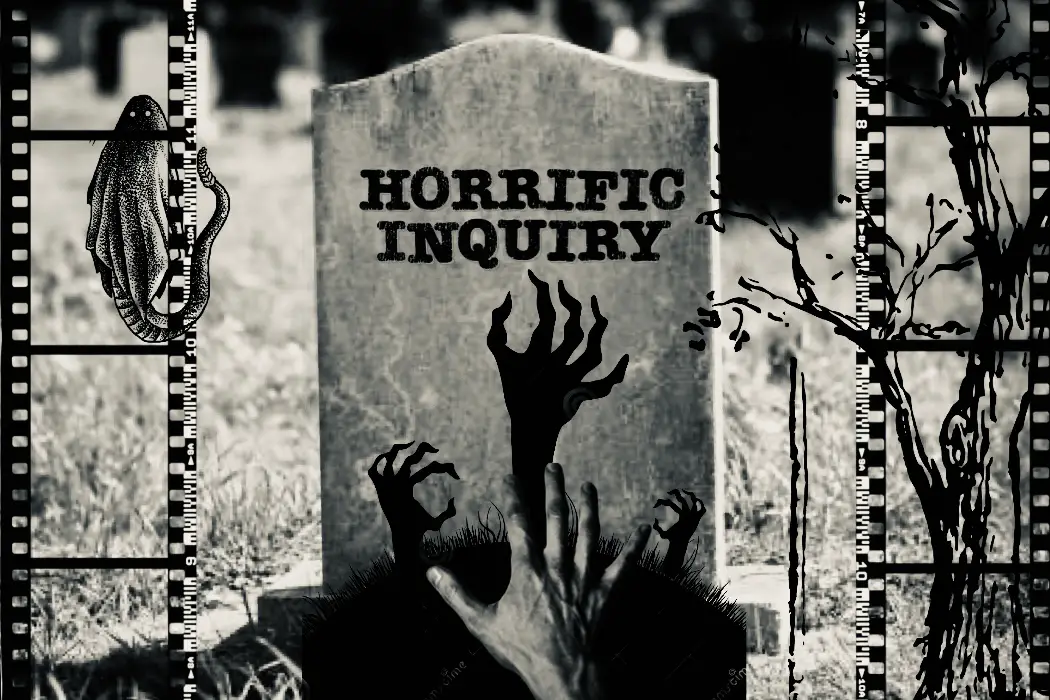
Stephanie Archer is 39 year old film fanatic living in…
Welcome back to the scariest, and at times goriest, column here at Film Inquiry: Horrific Inquiry. Twice a month, I will be tackling all things horror, bringing two films back into the spotlight to terrify and frighten once more. And occasionally looking at those that could have pushed the envelope further. Join us as we dive deep into the heart of horror, but warning, there will be spoilers.
“Words create lies. Pain can be trusted” – Audition (1999)
Akashi Miike‘s Audition is a film that strangely has always been on my must see, but has never reached the top of my viewing list. While there have been rave reviews from fans and critics alike for years, it was a single image that intrigued me. Much like the film’s main character, I was lured into the hypnotic and deep nature of Asami, dressed in a full protective apron while examining the length of the wire saw out stretched in her hands. The image boasts a warm light of yellow and orange hues that drastically contrasts the foreboding nature of the image, the picture alone capturing the deeply contrasting nature of the film itself.
Audition is a slow burner of a horror, an almost perfect example of a frog in boiling water. It works to create the intrigue and the mystery surrounding Asami and her true intentions, giving only glimpses into her true nature before revealing her cataclysmic explosion of brutality. Yet, it never feels as though it is dragging its feet, the escalating crescendo of cinematic beats keeping the viewer locked in to the final moments.
Grief and Moving on
Audition opens not with its main character, but in the innocence of a small child. As a small boy walks through the halls of an unknown building, we take in the oversized creation he carries with him, a card reading “Dear Mom, get well soon.”. Our suspicions of hime being in a hospital are confirmed moments later as the film introduces his father, Aoyama (Ryo Ishibashi), sitting beside his wife as her final moments pass by. There is an instant grief that sets in for the viewer as we come to understand what is transpiring. As his wife passes, there is a deep sorrow that takes over, one Ishibashi not only wields in the moment, but expands as son Shigehiko (Yuuto Arima) enters the room. The grief Aoyama feels transforms before us to the love for his son – and the need to be strong for him.
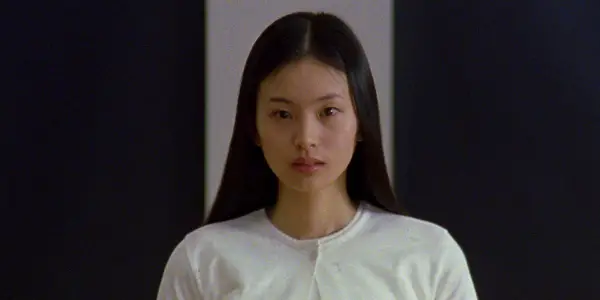
The film moves us forward seven years, where we find Aoyama and Shigehiko (Testu Sawaki) fishing together, their banter and exchanged expressions speaking to a deeply rooted bond between them. In the years since his wife’s passing, Aoyama has done all he can to give his son the best life he could give him. As they eat their catch that evening, Shigehiko remarks on how worn his father looks, further asking if he has ever thought of remarrying.
Audition in the moment boxes the idea of women and wife, a box it will continue to confine the film within to perfect effect. Women are there to take the burden from men, to keep them from being worn and overworked. Shigehiko does not ask his father if he will remarry because he finds his father lonely, depressed or in need of love – only because he is worn out. In this moment, Audition itemizes women as a means for the success of men. In this moment, the idea of the woman is reduced to nothing more than a herd of cattle or a prized horse, ready to be paraded in front of a longing potential owner and useful for taking taking the workload.
Cattle Audition
This feeling of cattle carries to the film’s central catalyst of events. In response to his son’s inquiry about remarrying as he looks worn out, Aoyama confides in a friend that he is seriously considering his son’s suggestion. While there is initial humor, Yoshikawa (Jun Kunimura) utilizes his TV and film connections to craft an audition for an “upcoming” movie with the intention of helping Aoyama find his future wife. Given a hundred applicants, Aoyama is asked to narrow the field down to thirty girls, and together they will hold auditions to find the perfect wife.
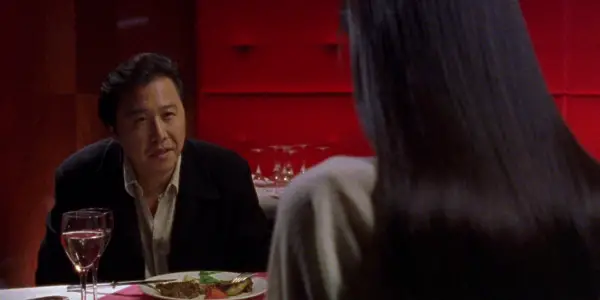
Yet, while Aoyama has narrowed the auditions to thirty girls, there is one that catches his eye from the moment he sees her picture. Finding himself irresistibly intrigued from looks alone, her deep understanding of death and the human condition shoot her to the top of his list. The auditions play out through a humorous montage of various personalities and colors. Each person comes through showing their own personality and talents, fighting for a role that doesn’t exist in the construct they have been told it does. When Aoyama’s audition of interest arrives, she is the only applicant dressed in white. While it speaks initially to a purity and innocence of Asami (Eihi Shiina), by film’s end, the audience comes to understand the white represents the blank canvas that is Asami. She is whatever she needs to be, never her true self – always delivering a practiced and routine response system. That is until she covers herself with the apron, giving a representational look at the darkness she hides within.
Not Everything is As it seems
Audition goes beyond the initial montage, Aoyama ringing Asami later on and inviting her out. She is presented as meek, quiet and shy when she is out with Aoyama, yet the film does not let us forget that something is off with Asami. Initially this comes in the warnings of friend Yoshikawa. When the audition concludes. Aoyama is enamored with Asami and ready to take the next steps. For Yoshikawa, who has proclaimed himself a great auditioner early on, states that she makes him nervous and gives him anxiety. He can not put his finger on it but something feels… off. This feeling stays with him, motivating him to do some digging into Asami. The manager she claims takes care of her sometimes is missing, disappeared eighteen months ago. Yoshikawa gets so nervous, he demands his friend stop pursuing her and take some time to cool off.
And while Aoyama does listen to his friend for a time, his desire for Asami proves to be stronger. She is his prize and the one he wants to make his wife. While he is tender with her and inquisitive about her past, he does not dig deeper to truly get to know her, eventually making promises he will never be able to keep. Informing Asami the movie ran into a snag and may never be made, he takes off on a weekend get away giving himself to Asami only to find her gone the next morning. While the film has worked with the warnings of Yoshikawa, it has also laid its own warning signs. Glimpses of Asami hunched over and frozen in time in her apartment are frequently shown. She sits, motionless, waiting for Aoyama to call her, a bulging bag always off in the distance. In these images, Asami appears to be suffering from a deep depression – that is until the phone rings. The camera closes in on her face, her lips breaking through her hanging hair. While Aoyama has tried to avoid her, his loss of self control and calling her brings a devious smile to her face. As the hair works like panes in a window, we as an audience see what Yoshikawa feels. Something is definitely wrong.
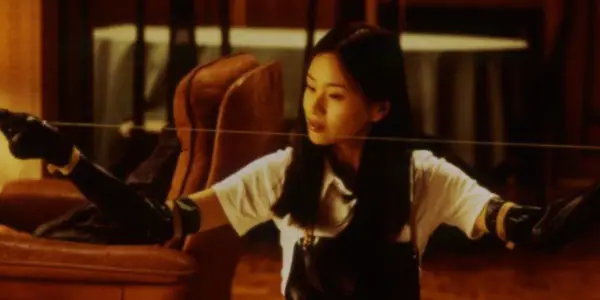
With all the warnings in place and the ominous feeling gnawing in the pit of your stomach, Audition begins its epic crescendo to the end. Waking alone in bed after making love to Asami, Aoyama descends into a maddening revelation of mystery, deceit and confusion. Consumed by the rejection of Asami’s disappearance and the wounding of his pride, Aoyama begins to look for her. Along the way, he discovers that the bar she claims to have worked at has been closed for some time following the murder of the owner. Her old ballet teacher feels as though he has been too intimate with her, the creepy prosthetics on his feet compounding his involvement with Asami. For Aoyama, he is determined to find Asami – little does he know it is she who will find him.
Pain Shows the True Self
It is in pain, Audition shows its true self. It is brutal and shocking, taking the film from 0 to 60 in a whiplash movement of surrealism and horror. The film has been so meticulously paced, slowly building its climatic explosion of pain and torture. Asami arrives at Aoyama’s home finding a picture of his wife, discovering the dog he keeps and the son he has cared for himself over the years. While it is the image of his wife that truly angers Asami, she sees everything as a violation Aoyama’s promise to her – to love her and no one else. Her entire entrance and interactions throughout the house are from a first person perspective, taking on the perspective of a classic horror slasher. Yet, this is not Michael Myers with an unknown reason for pain and brutality. Asami is clear in the violations she seeks to punish. For her, Aoyama is like all men and their treatment of the women they interact with.
Asami not only cites her own person grievances of him loving his son and his dog, but those of the women lied to in the audition. Each of these women submitted their names to be considered for an audition, and those selected paraded themselves around like a prized horse, showing their tricks in a hopes of being selected for a role that never existed. In this moment, we learn that it was never Aoyama that was drawing Asami to him but rather she drawing him to herself. With the culminating reveals of past murders and Asami’s recitation of her earlier words to Aoyama in her final moments before dying, we as an audience understand the compounding horror that Aoyama is not her first victim of pain.
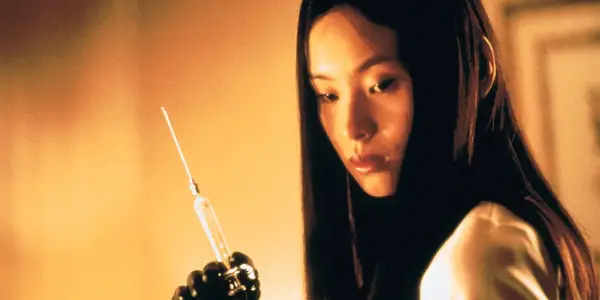
And painful it is. Paralyzing Aoyama through his whiskey and heightening the sensitivity of his nerves, Asami begins a deeply tortured vendetta. Taking acupuncture needles, she pierces his skin, reciting “deeper, deeper” (“kiri, kiri, kiri”) each time a new needle punctures his skin. Delicately spoken, Asami’s recitation of “deeper, deeper” will puncture viewers, crawling under the skin with the tantalizingly vindictive nature of each utterance. Yet, she is not satisfied with just causing pain, her torture escalating to mutation. Throughout the film, there have been warning signs. The three extra fingers, an ear and a tongue found at a murder sight – the prosthetic feet of her old ballet teacher. Without your feet you can not run, and the pain is almost unbearable.
Conclusion:
We see how unbearable this pain is, the film warping between reality and what could have been. To be honest, I was surprised at how short this climatic torture sequence was – and just as relieved. It is unrelenting and deeply disturbing. The amount of anger and maliciousness it is able to encompass makes it all the more disturbing. As the film moved into its final moments, I was certain Aoyama would be hauled out in pieces, never to be heard from again. Yet, in a shocking twist of events, Shigehiko arrives home unexpectedly entering into Asami’s final battle. He is the variable unchecked, and she is not prepared, her death an inevitable conclusion. Yet, as she lays dying, Aoyama finds he can still not look away from her.
When Audition ended, my mind was in a whirlwind. The film gives the viewer a sense of whiplash at the deeply contrasted two thirds of the film versus its ending. And before you know it, it has concluded. If you find yourself asking, “what did I just watch?”, let the dust settle, because as you will find, you too will be unable to shake Asami.
Does content like this matter to you?
Become a Member and support film journalism. Unlock access to all of Film Inquiry`s great articles. Join a community of like-minded readers who are passionate about cinema - get access to our private members Network, give back to independent filmmakers, and more.













